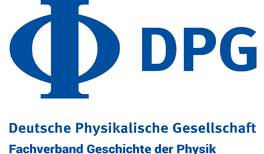Joint DPG and EPS History of Quantum Physics Symposium
In 2025 we will celebrate 100 years of quantum mechanics, and on 1 April the European Physical Society (EPS) will present Göttingen with the "EPS Historic Site" award.
On this occasion, the History of Physics Group of the EPS and the History of Physics Division of the DPG will hold a joint symposium on the history of quantum physics.
Monday, 31 March 2025, from 09:00
Programme
History of Quantum Mechanics I: Revolution, Representation, Reevaluation
09:00 - 10:30, ZHG010
Alexander Blum, Ludwig-Maximilians-Universität München, Germany
is speaking about
"Heisenberg's Umdeutung"
is speaking about
"Heisenberg's Umdeutung"
Arianna Borrelli, Technische Universität Berlin, Germany
is speaking about
"Representing quantum physics: The role of notation in the construction of quantum mechanics"
is speaking about
"Representing quantum physics: The role of notation in the construction of quantum mechanics"
Karl Grandin, Royal Swedish Academy of Science, Stockholm, Sweden
is speaking about
"The Nobel committee's position on quantum mechanics: Nominations, evaluations and decisions"
is speaking about
"The Nobel committee's position on quantum mechanics: Nominations, evaluations and decisions"
History of Quantum Mechanics II: Foundation, Dissemination, Politicization
14:00 - 15:30, ZHG010
Michael Stöltzner, University of South Carolina, Columbia, USA
is speaking about
"Model and Target: Von Neumann's Mathematische Grundlagen"
is speaking about
"Model and Target: Von Neumann's Mathematische Grundlagen"
Roberto Lalli, Politecnico di Torino, Turin, Italy
is speaking about
"Tracing the dissemination of quantum mechanics: A comparative approach"
is speaking about
"Tracing the dissemination of quantum mechanics: A comparative approach"
Mark Walker, Union College, Dept. of History, Schenectady, USA
is speaking about
"Quantum Mechanics and 'Aryan Physics'"
"Quantum Mechanics and 'Aryan Physics'"
Women in the History of Quantum Mechanics: The Project and its New Insights
16:00 - 18:00, Forum Wissen
Margriet van der Heijden, Eindhoven University of Technology, The Netherlands
is speaking about
"Women in the History of Quantum Physics"
"Women in the History of Quantum Physics"
Patrick Charbonneau, Duke University, Durham, USA
is speaking about
"Molecular WiHQP Vignettes: Hertha Sponer and Elizabeth Monroe"
is speaking about
"Molecular WiHQP Vignettes: Hertha Sponer and Elizabeth Monroe"
Andrea Reichenberger, Technical University of Munich, Germany
is speaking about
"Grete Hermann: A pioneer of the philosophical debate about the foundations of quantum mechanics and a political activist"
is speaking about
"Grete Hermann: A pioneer of the philosophical debate about the foundations of quantum mechanics and a political activist"
The Symposium is open to all conference participants and the interested public. Admission is free and registration for the conference is not necessary.


